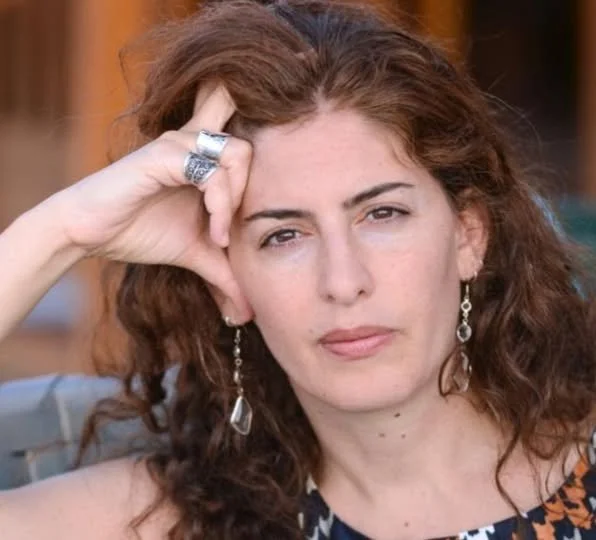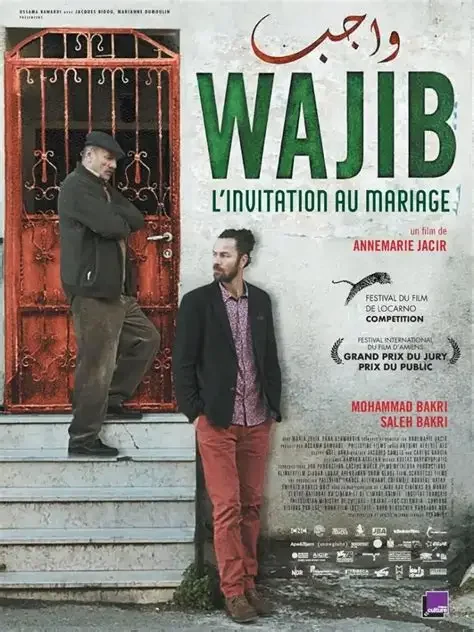ANNEMARIE JACIR
PALESTINE
Annemarie Jacir has written, directed and produced over sixteen films. Her films have premiered in Cannes, Berlin, Venice, Locarno, Rotterdam and Toronto. All three of her feature films were selected as Palestine’s official Oscar Entry. Her short film LIKE TWENTY IMPOSSIBLE (2003) was the first Arab short film in history to be selected in Cannes and continued to break ground as a finalist for the Academy Awards.
In 2007, Jacir shot the first feature film by a Palestinian female director, the acclaimed SALT OF THIS SEA, her second work to debut in Cannes, SALT OF THIS SEA went on to win the FIPRESCI Critics Award, and fourteen other international awards including Best Film in Milan. Her second feature WHEN I SAW YOU (2012) won Best Asian Film at the Berlinale and garnered a nomination at the Asian Pacific Screen Awards. Working in both fiction and documentary, other films include UNTIL WHEN, A FEW CRUMBS FOR THE BIRDS, and A POST OSLO HISTORY. Recently, WAJIB (2017) won 36 international awards including Mar Del Plata, Dubai, and London BFI Festival. With a commitment to mentoring, training and hiring locally, Annemarie also teaches, actively promoting independent cinema in the region. Founder of Philistine Films, she collaborates regularly as an editor, screenwriter and producer with fellow filmmakers. She has served as a jury member to numerous festivals including in Cannes, Sundance and Berlin, is a member of the Asia Pacific Screen Academy, AMPAS and BAFTA. Her fourth feature film PALESTINE 36 is her most ambitious project to date. In 2019, New York’s prestigious BAM art center held the first retrospective of her work. Most recently the Toronto International Film Festival (TIFF) hosted her in a retrospective of her work, screening many works for the first time. In November 2024, she was granted a BlackStar Luminary Award. In 2022, she directed for the groundbreaking Hulu hit series Ramy. She has been granted an honorary doctorate by Artois University in France for her contribution to cinema. She lives and works in Palestine.
PALESTINE 36
Directed and written by Annemarie Jaciralestine/United Kingdom/France/Denmark/Norway/Qatar/KSA/Jordan 2025, 1h 59min, DCP, in Arabic, English
| Colour / DCP
Screenplay: Annemarie Jacir
Cinematographer: Hélène Louvart, Sarah Blum, Tim Fleming
Score: Ben Frost
Principal Cast: Hiam Abbass, Kamel Al Basha, Yasmine Al Massri, Jalal Altawil,
Robert Aramayo, Saleh Bakri, Yafa Bakri, Karim Daoud Anaya, Wardi Eilabouni,
Ward Helou, Billy Howle, Dhafer L'Abidine with
Liam Cunningham and Jeremy Irons
Distributors:
North America: Watermelon Pictures - Home
Middle East: Mad Solution
UK: Curzon
France: Haut et Court
Turkey: TRT
Switzerland: Trigo
PALESTINE 36 Director’s Statement
Gazan poet Ne’ma Hasan said, “When the roads are blocked, draw a new map.” This has become our way of life, one we learned from our parents and grandparents. It feeds into everything we do; going to work, going to a doctor’s appointment, visiting family, making a film...
It has been a long-time dream to tell the story of the 1936-39 revolt, and telling it through the different points of views of an ensemble of characters came naturally. The 1936 uprising marks the most pivotal moment of our history and I was interested in telling the story in an intimate, raw and personal way. The script’s structure follows the various characters’ journeys, weaving in and out like embroidery. Every one of them is somehow connected to another. Their lives intersect, sometimes just barely. Each one is confronted with a moment that changes them, brings them to a place they did not expect and it is there they make a choice of how to go forward.
PALESTINE 36 is a period film, but I never conceived it as something of the past. It has always been current, relevant and alive. Sometimes critical, never nostalgic, always searching. Set in a time I never lived, PALESTINE 36 is deeply personal. We do not choose the circumstances of our lives, we do not choose war or the million painful moments we learn to survive. Sometimes we choose how we react to them. The idea of the film came to me in images. Simple at first – a hand-stitched lace curtain, a burnt black field, a dock worker staring at the waves, an old radio bringing unwanted news. A country finally erupts into open rebellion. Images became stories. My work is deeply entrenched in the world I live in. For PALESTINE 36, I disappeared into a river of research for the film. Reading every book, every document, every account I could get my hands on. Collecting images, photographs, film reels, and countless impressions. I could not stop thinking about the massacre at Al Bassa village, just 25 kilometers from my home today. My home in this land that gives to us and takes from us. A landscape which persists and survives and has room for all who love it. Of course the land would become a major character in the script’s embroidery. To make a film set at the height of the revolution means to capture a feeling, the same way that poetry does. A feeling that at that specific moment, in that small window, everything feels possible. Full of fear and full of hope and ambition. The most pivotal moment in our history. A circle was the strongest image; PALESTINE 36 was always a cyclical story.
PALESTINE 36 is a celebration of a defiant rebellion facing insurmountable military opposition: a dramatic portrayal of its failings and its resilience. Colonialism and imperialism, our own betrayals and affairs, we witness the disintegration of a country. In 1936, we lost a part of ourselves. I wonder did we lose? Did Empire win? This film is about all those things. It is a story of a village, a community of people full of dreams and desires. Ordinary people who find themselves in an extraordinary time. It is a nod to the persistence of the human spirit, the desire of a people to be free. It is our story.
Making this film is the most difficult thing I have ever done. When the genocide began, everything fell apart. Our people were being annihilated and we found ourselves trying to make a film about a dark moment in our history before we knew we’d be going through one of the darkest moments we have ever lived. We plunged into new depths, it felt like insanity. Sometimes we were broken. I lost count of the number of times production started and stopped. We kept going. The cast and crew came together to insist to make something, to pour all our pain into an act of love, to say to each other we will not be erased. The script, the story, the location, everything changed. One thing grew stronger. This film became an offering.
- Annemarie Jacir
SYNOPSIS
1936. As villages across Mandatory Palestine rise against British colonial rule, Yusuf drifts between his rural home and the restless energy of Jerusalem, longing for a future beyond the growing unrest. But history is relentless. With rising numbers of Jewish immigrants escaping antisemitism in Europe, and the Palestinian population uniting in the largest and longest uprising against Britain’s 30-year dominion, all sides spiral towards inevitable collision in a decisive moment for the British Empire and the future of the entire region.
HISTORICAL BACKGROUND
The farmer-led revolt against British colonialism in 1936 marked the beginning of the largest and longest uprising against Britain's 30-year rule. Palestinians from all classes were mobilized, and nationalistic sentiment spread in the Arabic press, schools, social and literary circles. The British, taken aback by the extent and intensity of the revolt, retaliated by placing Palestine under martial law, deploying over twenty thousand troops to Palestine, and still failed to control a population of less than one million people. Ships arrived loaded with tanks and machine guns. The Royal Air Force began strafing the countryside. Thousands of Palestinians were imprisoned, beaten, and the leadership exiled. The revolt lasted for three years and was arguably the largest and longest anti-colonial uprising in the British Empire.
NOTE OF CONTEXT
Featuring, among others, Hiam Abbass, Saleh Bakri, Dafer L’Abidine, Yasmine Al Massri, Billy Howle, Liam Cunningham, Robert Aramayo, and Jeremy Irons, PALESTINE 36 began preproduction in January 2023, prepping a myriad of locations across the country, sewing and embroidering costumes and village dresses, collecting old props from all over, and renovating and restoring an entire village, including planting fields of obsolete crops, as well as building old British war vehicles and weapons - in what was the country’s most ambitious film to date with a team of hundreds. After October 7th, they were forced to shut down production, and the team relocated production to Jordan. After thirteen months, they were able to return to complete shooting in Palestine against the odds. In November of 2024, after having to stop and start production four times due to the increasingly tense geopolitical situation, the team of PALESTINE 36 finally wrapped the final phase of shooting. The only feature film to shoot in Palestine in the last two years, the team continues their work and commitment in the belief that “every beautiful poem is an act of resistance.” (Mahmoud Darwish)
Other selected Features By Annemarie Jacir








